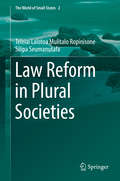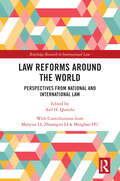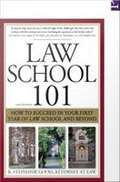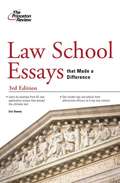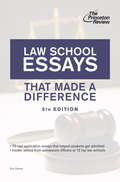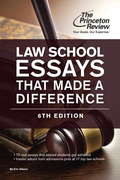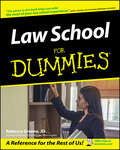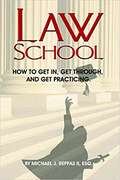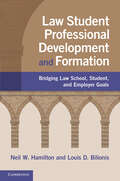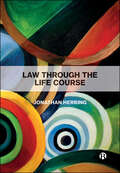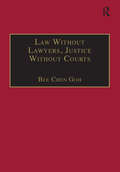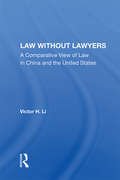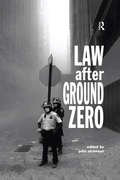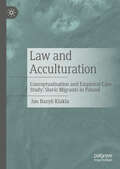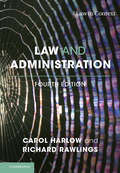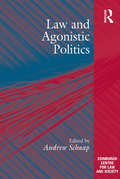- Table View
- List View
Law Office Management For Paralegals (Aspen Paralegal)
by Laurel A. VietzenLaw Office Management for Paralegals, Fourth Edition is a comprehensive introduction to law office management, emphasizing ethics, law office culture, law office systems, and “soft skills,” such as communications and critical thinking. Assignments are drawn from real-world law office management situations and supported by innovative visual aids and learning tools. Students get hands-on practice with timekeeping, conflicts-checking, file management, trust accounting, business planning, correspondence, and much more. They are exposed to law office software, such as Clio, and learn to perform vital functions using other software and even freeware. Career profiles emphasize the importance of involvement in professional organizations, advancement in the legal field without obtaining a law degree, and that the legal profession is populated by men and women of all ages and backgrounds. New to the Fourth Edition: New ethical discussions: the obligation to keep up with current technology, disaster planning, and dealing with clients using crowdfunding. New technology discussions: artificial intelligence in legal practice, online notarization, client portals, and apps to make the practice of law more efficient and mobile. New discussions of law as a business: features of property insurance, malpractice insurance, insurance for and on employees; trends in office space. New soft skills discussions: dealing with incivility in the legal profession, managing staff through technology changes. Professors and students will benefit from: Author Laurel A. Vietzen’s outstanding reputation in the paralegal market. Drawing on her extensive background as a professor and practitioner, she clearly presents basic law office management and organization. Well-crafted assignments throughout the text help students hone practical skills such as critical thinking, organization, general communication, and computer proficiency. The text is particularly adaptable for an online or hybrid class.
Law Reform in Plural Societies
by Teleiai Lalotoa Mulitalo Ropinisone Silipa SeumanutafaThis book asserts that the Pacific Islands continue to struggle with the colonial legacy of plural legal systems, comprising laws and legal institutions from both the common law and the customary legal system. It also investigates the extent to which customary principles and values are accommodated in legislation. Focusing on Samoa, the author argues that South Pacific countries continue to adopt a Western approach to law reform without considering legal pluralism, which often results in laws which are unsuitable and irrelevant to Samoa. In the context of this system of law making, effective law reform in Samoa can only be achieved where the law reform process recognises the legitimacy of the two primary legal systems. The book goes on to present a law reform process that is more relevant and suitable for law making in the Pacific Islands or any post-colonial societies.
Law Reforms around the World: Perspectives from National and International Law (Routledge Research in International Law)
by Asif H. QureshiEncapsulating Law Reform requires the creation of a discreet space occupied with normative self-generation, self-correction, and self-adaptation in the very anatomy of law and the architecture of legal systems. This ‘living dynamic trait’ should be a hallmark of the genetic material in the modern-day institution of law. This edited volume sheds light on Law Reform in its domestic, comparative, regional, and international settings. It examines the process of Law Reform and explains the need for a constant appraisal to keep its wheels optimally operational. The book takes a holistic approach to understanding Law Reform and calls for such an approach in the very process of Law Reform. It begins by looking at Law Reform processes from a theoretical perspective. Thereafter, it sheds light on domestic Law Reform processes in civil and common law legal systems. This is followed by a focus on Law Reform at the international level with a critical appraisal of the International Law Commission (ILC), drawing on its performance in international economic and environmental law. Included in this consideration is also the role played in Law Reform by the IMF, World Trade Organization/World Intellectual Property Organization, Multilateral Development Banks, and the African Union Commission on International Law. This volume should appeal to students, serious scholars, policy makers, judges, and the community of national and international lawyers interested in bringing effective reform in the national and international arenas.
Law Relating To Theft
by C. WalshThis series of papers was presented at a conference held in 1992 to mark the twenty-fifth anniversary of the creation of a first national Ombudsman under the Parliamentary Commissioner Act 1967. The distinguished contributors present an intriguing picture of the Ombudsman in a number of contexts. Accessibility to the Parliamentary Commissioner is considered and there is an analysis of the arguments surrounding recent proposals for a so called Prison Ombudsman. A comparative dimension is introduced with an examination of the Polish Commissioner for Civil Rights Protection. A significant element of the paper on the issue of competence to deal with the legality of administrative action. There is also an examination of the dynamics that continue to shape the Local Government Ombudsman remedy.
Law Relating to Computers Internet and E-Commerce
by Nandan KamathLaw Relating to Computers, Internet + E-Commerce by Nandan Kamath is a comprehensive legal treatise that addresses the challenges and complexities posed by the digital revolution. It serves as an essential guide to understanding India’s cyber laws, particularly the Information Technology Act, 2000, along with its associated rules, regulations, and amendments. The book explores key legal concerns in cyberspace including electronic contracts, digital signatures, data privacy, cybercrimes, domain name disputes, and intellectual property rights. It provides insights into emerging issues like cyberstalking, cyberporn, and the taxation of e-commerce, supported by detailed case law and international perspectives. With contributions from legal scholars and students, and a foreword by Prof. N.R. Madhava Menon, this updated fifth edition remains an authoritative resource for lawyers, IT professionals, policymakers, and students navigating the intersection of law and technology in the digital age.
Law School 101
by R. Stephanie GoodEverything you need to know to excel in your first year of law school and beyond. Whether you are thinking about law school, have already applied and been accepted, or started your first year, you need to know what to expect in law school and how to succeed. Law School 101 gives an honest look at the law school experience from someone who has been there, and tells students what they should really expect. It also helps students develop the skills necessary to survive the challenges and excel in their program. It includes the survival skills you need in key areas, including: Handling the pressure of law school What to expect from your classes and professors How to study for and pass your law school exams Job information for first and second year students Avoid common pitfalls, decode law school myths, and achieve your dream.
Law School Confidential
by Robert M. MillerIt provides a comprehensive, chronological account of what to expect at every stage of law school experience. This new, completely revised and updated edition contains the very latest information and strategies for thriving in law school.
Law School Confidential: A Complete Guide to the Law School Experience: By Students, for Students
by Robert H. MillerI WISH I KNEW THEN WHAT I KNOW NOW!Don't get to the end of your law school career muttering these words to yourself! Take the first step toward building a productive, successful, and perhaps even pleasant law school experience--read this book!Written by students, for students, Law School Confidential has been the "must-have" guide for anyone thinking about, applying to, or attending law school for more than a decade. And now, in this newly revised third edition, it's more valuable than ever. This isn't the advice of graying professors or battle-scarred practitioners long removed from law school. Robert H. Miller has assembled a blue-ribbon panel of recent graduates from across the country to offer realistic and informative firsthand advice about what law school is really like.This updated edition contains the very latest information and strategies for thriving and surviving in law school--from navigating the admissions process and securing financial aid, choosing classes, studying and exam strategies, and securing a seat on the law review to getting a judicial clerkship and a job, passing the bar exam, and much, much more. Newly added material also reveals a sea change that is just starting to occur in legal education, turning it away from the theory-based platform of the previous several decades to a pragmatic platform being demanded by the rigors of today's practices.Law School Confidential is a complete guide to the law school experience that no prospective or current law student can afford to be without.
Law School Essays That Made a Difference
by Eric OwensOne of the best ways to stand out in a crowd of applicants to law school is to write an exceptional personal statement. Law School Essays That Made a Difference, 3rd Edition, contains 70 real application essays as well as interviews with admissions pros and with students who've been through the process and made it to law school.
Law School Essays That Made a Difference, 5th Edition
by Princeton ReviewStand out in a crowd of law school applicants with an outstanding personal statement. Law schools are receiving more applications than ever with high LSAT scores and excellent grades. To get in, you also need a personal statement that shines. The fifth edition of Law School Essays That Made a Difference gives you the tools to do just that. It includes: * 70 real essays written by 62 unique future lawyers attending Columbia, Cornell, Duke, Georgetown, Harvard, Northwestern, Vanderbilt, Yale, and other top law schools--along with each applicant's test scores, GPA, and admissions profile * An overview of law school admissions and a "crash course" in prepping your application * Insider advice: Interviews with admissions pros at Berkeley, Cornell, Duke, Georgetown, Northwestern, Texas Tech, UCLA, University of Kansas, University of Michigan, UPenn, University of Richmond, and William & Mary Law School Essays That Made a Difference, 5th Edition includes essays written by students who enrolled at the following schools:Amherst CollegeBard CollegeBarnard CollegeBoston CollegeBrown UniversityBryn Mawr CollegeCalifornia Institute of TechnologyClaremont McKenna CollegeCornell UniversityDartmouth CollegeDuke UniversityEmerson CollegeFranklin W. Olin College ofEngineeringGeorgetown UniversityHarvard CollegeMassachusetts Institute ofTechnologyMiddlebury CollegeNew College of FloridaNew York UniversityNorthwestern UniversityPomona CollegePrinceton UniversityRice UniversitySmith CollegeStanford UniversitySwarthmore CollegeUniversity of California--San DiegoUniversity of Notre DameUniversity of PennsylvaniaWashington and Lee UniversityWellesley CollegeWesleyan UniversityYale University
Law School Essays That Made a Difference, 6th Edition
by Princeton ReviewThe inside word on law school admissions.To get into a top law school, you need more than high LSAT scores and excellent grades--you also need a personal statement that shines. Law School Essays That Made a Difference, 6th Edition, gives you the tools to craft just that. This book includes:* 70 real essays written by 63 unique law students attending Columbia, Harvard, Northwestern, Vanderbilt, and other top law schools--along with each applicant's test scores, GPA, and admissions profile * An overview of law school admissions and tips for prepping your applications* Insider advice: Interviews with admissions pros at 17 top law schools, including Berkeley, Northwestern, UCLA, and many moreLaw School Essays That Made a Difference, 6th Edition, includes essays written by students who enrolled at the following law schools:American University Washington College of LawBoston College Law SchoolBoston University School of LawColumbia University School of LawCornell University School of LawDuke University School of LawEmory University School of LawGeorgetown University Law CenterHarvard University Law SchoolNew York University School of LawNorthwestern University School of LawThe University of Chicago Law SchoolUniversity of Michigan Law SchoolUniversity of Pennsylvania Law SchoolUniversity of Virginia Law SchoolYale University Law SchoolFrom the Trade Paperback edition.
Law School Exams: Preparing and Writing to Win
by Charles CallerosOverview Law School Study Techniques Preparing for Exams Taking Law School Exams
Law School For Dummies
by Rebecca Fae GreeneThe straightforward guide to surviving and thriving in law school Every year more than 40,000 students enter law school and at any given moment there are over 125,000 law school students in the United States. Law school's highly pressurized, super-competitive atmosphere often leaves students stressed out and confused, especially in their first year. Balancing life and schoolwork, passing the bar, and landing a job are challenges that students often need help facing. In Law School For Dummies, former law school student Rebecca Fae Greene uses straight talk, sound advice, and gentle humor to help students sort through the swamp of coursework and focus on what's important-all while maintaining a life. She also offers rare insight on the law school experience for women, minorities, non-traditional, and non-Ivy League students.
Law School Without Fear: Strategies For Success
by Helene Shapo Marshall ShapoWith a total of 50 years of experience teaching law school between them, the authors of Law School Without Fear offer law students strategies for coping with law school successfully and advice on how to get the most out the law school experience. The book discusses in simple terms what students need to know about law school, covering common problems that law students encounter and solutions to those problems. Topics covered include briefing a case, precedent and how to use it, balancing competing interests and factors, legal writing, and psychological tips for the study of law. Special features include a comprehensive approach to the first year, from the bewildering first day of class through examinations; advice on how to study, how to deal with the classroom experience, and how to take exams; wonderfully brief summaries of fundamental ideas of policy common to almost all law classes; and glossary of frequently used words and phrases.
Law School: How to Get in, Get Through, and Get Practicing
by Michael J. Reppas II<p>Filled with personal anecdotes about his law school years, Law School, How to Get in, Get Through, and Get Practicing, by Michael J. Reppas II, Esq., offers all future law students a peek into the ever-surprising, nerve-racking, adventure known as law school, where no book is left unturned and no hour spent resting. This is your law school guide from start to finish. <p>You'll laugh at the author's own experiences as a fledgling one-L and read how he gains the confidence and skill to land a spot at the prestigious Law Review, get published, get awards, pass the bar, and become an attorney. You'll be entertained while gaining valuable insight into what it really takes to get into law school, get through it, and get practicing! <p>Your first mistake before going to law school would be to not read this book! Your second mistake would be to not read this book a second time. When you're finished you'll want to experience it all for yourself.</p>
Law Student Professional Development and Formation: Bridging Law School, Student, and Employer Goals
by Neil W. Hamilton Louis D. BilionisLaw schools currently do an excellent job of helping students to 'think like a lawyer,' but empirical data show that clients, legal employers, and the legal system need students to develop a wider range of competencies. This book helps legal educators to understand these competencies and provides practical ways to build them into a law school curriculum. Based on recommendations from the American Bar Association, the American Association of Law Schools, and the Carnegie Foundation for the Advancement of Teaching, it will equip students with the skills they need not only to think but to act and feel like a lawyer. With this proposed model, students will internalize the need for professional development toward excellence, their responsibility to others, a client-centered approach to problem solving, and strong well-being practices. These four goals constitute a lawyer's professional identity, and this book empowers legal educators to foster each student's development of a professional identity that leads to a gratifying career that serves society well. This title is Open Access.
Law Through the Life Course
by Jonathan HerringCourt decisions are typically seen as one-off interventions relating to an incident in a person’s life, but a legal decision can impact on the person as they were and the person they will become. This book is the first to explore the interactions of the law with the life course in order to understand the complex life journey as a whole. Jonathan Herring reveals how the law privileges ‘middle age’ to the detriment of the whole life story and explains why an understanding of the life course is important for lawyers. Relevant to those working in family law, elder law, medical law and ethics, jurisprudence, gender and the law, it will promote new thinking by exploring the engagement of the law with the life course of the self.
Law Unlimited (Social Justice)
by Margaret DaviesThis book engages with a traditional yet persistent question of legal theory – what is law? However, instead of attempting to define and limit law, the aim of the book is to unlimit law, to take the idea of law beyond its conventionally accepted boundaries into the material and plural domains of an interconnected human and nonhuman world. Against the backdrop of analytical jurisprudence, the book draws theoretical connections and continuities between different experiences, spheres, and modalities of law. Taking up the many forms of critical and socio-legal thought, it presents a broad challenge to legal essentialism and abstraction, as well as an important contribution to more general normative theory. Reading, crystallising, and extending themes that have emerged in legal thought over the past century, this book is the culmination of the author’s 25 years of engagement with legal theory. Its bold attempt to forge a thoroughly contemporary approach to law will be of enormous value to those with interests in legal and socio-legal theory.
Law Without Lawyers, Justice Without Courts: On Traditional Chinese Mediation
by Bee Chen GohThe Chinese have, since ancient times, professed a non-litigious outlook. Similarly, their preference for mediation has fascinated the West for centuries. Mediation has been popularized by the Chinese who subscribe to the Confucian notions of harmony and compromise. It has been perpetuated in the People's Republic of China and by the overseas Chinese communities elsewhere, such as in Malaysia and Taiwan. Seen as the chief contributing factor in their litigation-averse nature, as well as the reason behind the significant role given to traditional mediation, this compelling book traces the cultural tradition of the Chinese. It uses rural Chinese Malaysians as illustrative examples and offers new insights into the nature of mediation East and West. It is an important reference and essential resource for anyone keen to learn about traditional Chinese concepts of law, justice and dispute settlement. Equally, it makes a unique contribution to the existing ADR literature by undertaking a socio-legal study on traditional Chinese mediation.
Law Without Lawyers: A Comparative View Of Law In The United States And China
by Victor H. LiThe U.S. has 400,000 lawyers in a society of 200 million people. China, a country with four times that population, has a mere 3,500 lawyers. How do the Chinese achieve law without lawyers? Victor Li, one of the world's leading authorities on Chinese law, explores the way the Chinese and U.S. systems have historically viewed law (and still view it), and the way each system functions in everyday life to shape conduct and control deviance. In a straightforward and highly readable manner, the author examines how these highly divergent societies operate. He writes about historical forces and cultural values that are centuries old—and that are still critical influences in shaping life in modern America and China. In explaining the differences in the tradition and operation of law in these two cultures, Li gives us both an invaluable understanding of Chinese society today and his own appraisal of the strengths and weaknesses of U.S. law, lawyers, and courts.
Law after Ground Zero
by John StrawsonFollowing the events of September 11, a new legal order is emerging in which the 'terrorist threat' has been used as justification to marginalise human rights. This collection of themed essays offers an emphatic defence to the threats confronting our human rights culture. In analysing the role of the United Nations, the conduct of the Afghan war, domestic anti-terrorist legislation and the new debate about Islamic law, Law after Ground Zero demonstrates the future challenges that law will face within our global society. It also offers accounts of how events have impacted on the Palestinian-Israeli conflict, Iraq and Afghanistan itself, as well as debates about international law, human rights and women's rights. This unique work will interest those studying or researching in the areas of international law, human rights and humanitarian law, international relations, politics, critical legal studies, Islamic law, culture and socio-legal studies.
Law against the State
by Brian Donahoe Zerrin Özlem Biner Julia Eckert Christian StrümpellThis collection of rich, empirically grounded case studies investigates the conditions and consequences of 'juridification' – the use of law by ordinary individuals as a form of protest against 'the state'. Starting from the actual practices of claimants, these case studies address the translation and interpretation of legal norms into local concepts, actions and practices in a way that highlights the social and cultural dynamism and multivocality of communities in their interaction with the law and legal norms. The contributors to this volume challenge the image of homogeneous and primordially norm-bound cultures that has been (unintentionally) perpetuated by some of the more prevalent treatments of law and culture. This volume highlights the heterogeneous geography of law and the ways boundaries between different legal bodies are transcended in struggles for rights. Contributions include case studies from South Africa, Malawi, Sierra Leone, Turkey, India, Papua New Guinea, Suriname, the Marshall Islands and Russia.
Law and Acculturation: Conceptualisation and Empirical Case Study: Slavic Migrants in Poland
by Jan Bazyli KlaklaThis book is one of the first attempts to directly explore the relationship between law and acculturation. By exploring the theoretical basis of the concept of culture, the ideas of law and various models of acculturation, it brings a nuanced theorization and problematization of the intricate connection between law and acculturation. It does this through theory and then presents the findings of the author’s qualitative empirical study conducted with a group of long-term Slavic migrants residing in Poland. The book culminates by demonstrating how the law can be integrated into one of the theoretical models of acculturation, specifically the Relative Acculturation Extended Model.
Law and Administration (Law in Context)
by Richard Rawlings Carol HarlowLaw and Administration takes a contextual approach to administrative law, setting law and legal rules in the context of the social, political and economic forces that shape the law, and of the complex constitutional framework in which contemporary administrative law operates. This book contains a full account of judicial review, the traditional heartland of administrative law, and adds to this by taking into account the concerns of government, officials and agencies who operate and shape the law. It also looks at the possible future of administrative law in an increasingly automated and digitalised world. A fully revised and updated new edition, this book includes new case studies of regulatory agencies and government contracting to develop understanding of law in practice.
Law and Agonistic Politics (Edinburgh/glasgow Law And Society Ser.)
by Andrew SchaapThe Ancient Greek notion of agonism, meaning struggle, has been revived in radical legal and political theory to rethematize class conflict and to conceptualize the conditions of possibility of freedom and social transformation in contemporary society. Insisting that what is ultimately at stake in politics are the terms in which social conflict is represented, agonists highlight the importance of the strategic, affective and aesthetic aspects of politics for democratic praxis. This volume examines the implications of this critical perspective for understanding law and considers how law serves either to sustain or curtail the democratic agon. While sharing a critical perspective on the deliberative turn in legal and political theory and its tendency to depoliticize social conflict, the various contributors to this volume diverge in arguing variously for pragmatic, expressivist or strategic conceptions of agonism. In doing so they question the glib assumptions that often underlie a sometimes too easy celebration of conflict as an antidote to de-politicizing consensus. This thought provoking volume will be of interest to students and researchers working in legal and political theory and philosophy.

